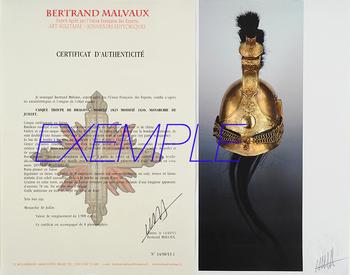
Madagascar Expedition. AUTOGRAPH LETTER SIGNED BY MARSHAL JOSEPH GALLIENI, Governor General of Madagascar after the deposition of Queen Ranavalona III, TO MR. TRIBE, April 13, 1897.
Sold out
Madagascar Expedition. SIGNED AUTOGRAPH LETTER FROM MARSHAL JOSEPH GALLIENI, Governor General of Madagascar after the deposition of Queen Ranavalona III, TO MR. TRIBE, April 13, 1897. 18899-9
Interesting letter from the Governor General of Madagascar after the deposition of Queen Ranavalona III:
"Tananarive 13th April.
My dear Mr. Tribe,
In a hurry, I send you these few lines. Our affairs here are improving day by day and the departure of the Queen has brought us results that are quite surprising in terms of pacification. I am beginning to be able to affirm that we will still have acts of federalism during the good season, but no insurrection. I am tightening my grip on the Hova population and starting to firmly focus on penetrating the Sakalava country. However, there seems to have been some concern at the ministry regarding the deposition of the Queen. Needless to say, if this measure is disapproved, I will immediately take the road back to France..."
Dimensions: 17.5 cm x 11 cm. 1 page.
Good condition, two small cracks at the bottom of the page, fold marks.
Joseph GALLIENI, born on April 24, 1849 in Saint-Béat (Haute-Garonne) and died on May 27, 1916 in Versailles, was a French general, Marshal of France, and colonial administrator.
Governor General of Madagascar (1896-1905)
Promoted to brigadier general, he was sent to Madagascar in 1896 as the General Resident. He arrived in Tananarive on September 15. Unlike his predecessor General M. Laroche's diplomatic method, Gallieni preferred a more forceful approach to stem the rise of anti-colonial resistance. He instituted forced labor for the natives by imposing 50 days of compulsory work per adult. The royal court, a center of resistance against France, was placed under surveillance.
Pacification of Madagascar: execution of Ratsimamanga and Rainandriamampandry.
On October 11, 1896, the day after the former General Resident Laroche departed, Gallieni, who had full powers, had Prince Ratsimamanga and Rainandriamampandry, Minister of the Interior, arrested and brought before the Council of War for rebellion and "fahavalism." On October 15, following a sham trial, they were sentenced to death and executed as an example, aiming to make a "strong impression on the natives." One of the Council of War members later confirmed that the two accused had been "sentenced on Gallieni's order." Gallieni destroyed the trial report rather than sending it to the military archives.
Queen Ranavalona III was accused of conspiring against French influence, deposed on February 27, 1897, and exiled to the island of Reunion, declaring the end of the Malagasy monarchy and the Merina dynasty. In his eight-year proconsulship, Gallieni pacified the island, proceeding with its colonization. The establishment of forced labor and mass summary executions that characterized the repression led by Gallieni against the Malagasy resistance to colonization resulted in many deaths.
He abolished slavery in Madagascar in 1896, leading to the liberation of over 500,000 slaves throughout the country.
Paul Vigné d'Octon denounced the Ambiky massacre in the Chamber of Deputies in 1900, pointing to Commandant Augustin Gérard and his superior Joseph Gallieni as possible organizers. Gallieni's actions at Menalamba in Madagascar resulted in the maintenance of slavery on the island, which he had earlier abolished.
According to General Gallieni, military action had to be accompanied by assistance to the colonized peoples in various areas such as administration, economy, and education. It required continuous contact with the inhabitants and a thorough knowledge of the country and its languages. Under Gallieni's guidance, numerous infrastructures were established: the railroad from Tamatave to Tananarive, the Pasteur Institute, secular schools providing education in French.
His subordinate, the future Marshal of France Hubert Lyautey, then a commander, considered him as "the most wonderful specimen of a man of action, an organizer, that we can pit against the Anglo-Saxons on the other side at the end of this century. Madagascar against South Africa, Gallieni against Cecil Rhodes: a great game to play."
General Gallieni implemented the policy known as the policy of races, which involved recognizing the identity of each ethnic group and ending their subordination to another ethnic group, primarily to end the longstanding Merina domination, with the Merinas being the most hostile to French domination. Relying on writings by anthropologists and travelers of the 19th century and after a systematic population census using photography, he attempted to draw up administrative divisions based on this racial mapping.
Queen RANAVALONA III: 1862-Alger 1917. Queen of Madagascar 1883-1897, cousin of the previous queen. Widowed from Prince Ratrima (1883), she married Prime Minister Rainilaiarivony, who was already widowed by two previous queens. After the blockade by the French fleet, she signed the Treaty of Tamatave, ceding the bay of Diego-Suarez and control of diplomacy to France (December 17, 1885). After the transformation of the protectorate into a colony (August 1896), the queen was implicated in the uprising and was deposed by Gallieni (February 1897). She was deported to Reunion, then to Algiers.
Interesting letter from the Governor General of Madagascar after the deposition of Queen Ranavalona III:
"Tananarive 13th April.
My dear Mr. Tribe,
In a hurry, I send you these few lines. Our affairs here are improving day by day and the departure of the Queen has brought us results that are quite surprising in terms of pacification. I am beginning to be able to affirm that we will still have acts of federalism during the good season, but no insurrection. I am tightening my grip on the Hova population and starting to firmly focus on penetrating the Sakalava country. However, there seems to have been some concern at the ministry regarding the deposition of the Queen. Needless to say, if this measure is disapproved, I will immediately take the road back to France..."
Dimensions: 17.5 cm x 11 cm. 1 page.
Good condition, two small cracks at the bottom of the page, fold marks.
Joseph GALLIENI, born on April 24, 1849 in Saint-Béat (Haute-Garonne) and died on May 27, 1916 in Versailles, was a French general, Marshal of France, and colonial administrator.
Governor General of Madagascar (1896-1905)
Promoted to brigadier general, he was sent to Madagascar in 1896 as the General Resident. He arrived in Tananarive on September 15. Unlike his predecessor General M. Laroche's diplomatic method, Gallieni preferred a more forceful approach to stem the rise of anti-colonial resistance. He instituted forced labor for the natives by imposing 50 days of compulsory work per adult. The royal court, a center of resistance against France, was placed under surveillance.
Pacification of Madagascar: execution of Ratsimamanga and Rainandriamampandry.
On October 11, 1896, the day after the former General Resident Laroche departed, Gallieni, who had full powers, had Prince Ratsimamanga and Rainandriamampandry, Minister of the Interior, arrested and brought before the Council of War for rebellion and "fahavalism." On October 15, following a sham trial, they were sentenced to death and executed as an example, aiming to make a "strong impression on the natives." One of the Council of War members later confirmed that the two accused had been "sentenced on Gallieni's order." Gallieni destroyed the trial report rather than sending it to the military archives.
Queen Ranavalona III was accused of conspiring against French influence, deposed on February 27, 1897, and exiled to the island of Reunion, declaring the end of the Malagasy monarchy and the Merina dynasty. In his eight-year proconsulship, Gallieni pacified the island, proceeding with its colonization. The establishment of forced labor and mass summary executions that characterized the repression led by Gallieni against the Malagasy resistance to colonization resulted in many deaths.
He abolished slavery in Madagascar in 1896, leading to the liberation of over 500,000 slaves throughout the country.
Paul Vigné d'Octon denounced the Ambiky massacre in the Chamber of Deputies in 1900, pointing to Commandant Augustin Gérard and his superior Joseph Gallieni as possible organizers. Gallieni's actions at Menalamba in Madagascar resulted in the maintenance of slavery on the island, which he had earlier abolished.
According to General Gallieni, military action had to be accompanied by assistance to the colonized peoples in various areas such as administration, economy, and education. It required continuous contact with the inhabitants and a thorough knowledge of the country and its languages. Under Gallieni's guidance, numerous infrastructures were established: the railroad from Tamatave to Tananarive, the Pasteur Institute, secular schools providing education in French.
His subordinate, the future Marshal of France Hubert Lyautey, then a commander, considered him as "the most wonderful specimen of a man of action, an organizer, that we can pit against the Anglo-Saxons on the other side at the end of this century. Madagascar against South Africa, Gallieni against Cecil Rhodes: a great game to play."
General Gallieni implemented the policy known as the policy of races, which involved recognizing the identity of each ethnic group and ending their subordination to another ethnic group, primarily to end the longstanding Merina domination, with the Merinas being the most hostile to French domination. Relying on writings by anthropologists and travelers of the 19th century and after a systematic population census using photography, he attempted to draw up administrative divisions based on this racial mapping.
Queen RANAVALONA III: 1862-Alger 1917. Queen of Madagascar 1883-1897, cousin of the previous queen. Widowed from Prince Ratrima (1883), she married Prime Minister Rainilaiarivony, who was already widowed by two previous queens. After the blockade by the French fleet, she signed the Treaty of Tamatave, ceding the bay of Diego-Suarez and control of diplomacy to France (December 17, 1885). After the transformation of the protectorate into a colony (August 1896), the queen was implicated in the uprising and was deposed by Gallieni (February 1897). She was deported to Reunion, then to Algiers.
Reference :
18899-9

Next update Friday, april 4th at 1:30 PM
FOR ALL PURCHASES, PAYMENT IN MULTIPLE CHECKS POSSIBLE
bertrand.malvaux@wanadoo.fr 06 07 75 74 63
An authenticity certificate of the item including the description published on the site, the period, the sale price, accompanied by one or more color photographs is automatically provided for any item priced over 130 euros. Below this price, each certificate is charged 5 euros.
Only items sold by me are subject to an authenticity certificate, I do not provide any expert reports for items sold by third parties (colleagues or collectors).

